Spoilers For The Lord Of The Rings Ahead!
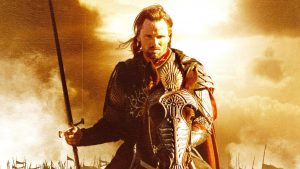
Happy Hobbit Day to all of my readers! Today, we celebrate the shared birthdays of hobbit heroes Frodo and Bilbo Baggins, chief protagonists of the fictional world of Middle-earth (you know, unless you’re counting the heroes of The Silmarillion, like Beren, Tuor, Húrin and Túrin, Lúthien Tinúviel, Eärendil, and so on). And because this is a movie blog, and not a book blog, I will be discussing The Lord Of The Rings movies rather than The Lord of the Rings novels in this post. Typically, I would only consider writing an extensively long post about a movie I disliked, but I have so much to say about these films, and so much of it is good (actually, almost all of it is good).
The Lord Of The Rings: The Return Of The King, the third film in the classic trilogy, is currently available to stream on Netflix: here’s my review. I’m not going to be doing my usual hardcore fan-frenzy, where everything I write about the trilogy is unintelligible screaming, sobbing and wailing. Instead, I am going to write about the movie in a clear, concise way – with only a minimal amount of sobbing.
That’s going to be an increasingly difficult feat, I’m sure.
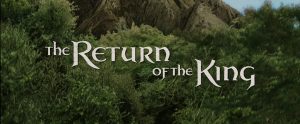
So we come to it, the final installment of Peter Jackson’s massive three-part cinematic masterpiece. Return Of The King is most beloved by the industry, which looks at its 11 Oscar wins and billion-dollar box-office intake, and most harshly critiqued by the fandom, who point out some of Jackson’s most egregious changes to the canon yet. As with all the Middle-earth films (except The Hobbit: The Battle Of The Five Armies), I cherish this one unconditionally, but I will admit that…well, it has some of the best moments in the trilogy, and some of the worst. It’s probably got the worst pacing in the trilogy, though that’s very much due to the fact that Jackson was trying to wrestle a non-linear story with about a dozen subplots and converging story threads into a cohesive whole that also had to have a clear three-act structure despite the fact that…well, it doesn’t have one – to an outside viewer, unfamiliar with the world of Middle-earth, the film probably looks like a mess. And it is messy in parts, but the messiness is only an obstacle: Jackson works through it in the second act and delivers a crowd-pleasing, rousing finale…and then a second one…and then a third one, and this one is really good…and then one last one, emotional, intense, pulled bravely from the page to the screen with few alterations. See what I mean when I refer to messiness? To us fans, each of those endings are necessary parts of the story: to the film’s (admittedly few) detractors, they were overly long and drawn out, and also too weird for general audiences – why was the hero leaving on some boat? Where was he going? Was he dead?
But, in true Tolkienesque style, it was The Return Of The King, defying all odds, which swept into awards season like a juggernaut with one of the most determined Oscar campaigns ever run: winning (among others) three Golden Globes; one Screen Actors Guild Award for an outstanding ensemble cast; five BAFTA awards; the MTV award for Best Movie; a Hugo Award and a Nebula Award; a Directors Guild of America Award; a Producers Guild of America award; the New York Film Critics Circle Award; the Saturn Award for Best Director; and sweeping the Oscars clean, winning in every category it was nominated, including Best Director, and, of course, Best Picture. It was the first time a fantasy film had ever won that highest honor in Hollywood: it was a landmark moment in the history of genre filmmaking – and yet, we tend to overlook how important it was for filmmaking in general. Lots of attention is lavished on King‘s importance for fantasy, for its influence on the growing number of fantasy adaptations these days, for its effect on popular culture. In so doing, we often overlook the fact that it is, in fact, a great movie on its own, even separate from the genre that birthed it (or that it birthed). Yes, it has magic rings and monsters, but it also has a compelling and thought-provoking story, powerful themes, incredible acting, brilliant directing, cinematography and production design, and all the hallmarks of an instant classic. And yes, it did indeed kick-start 21st Century fantasy, but it’s the film that launched a thousand careers: Weta Digital is one of the world’s leading digital effects companies because of their recognition at the Academy Awards; Cate Blanchett is a two-time Academy Award-winner today partly because of the global recognition she gained from Lord Of The Rings, and Viggo Mortensen is a three-time nominee; Andy Serkis is the world’s pre-eminent expert on motion capture CGI because he was Gollum (and still gets plenty of work just by parodying his own performance); Middle-earth was New Line’s biggest and most successful franchise for years, and still is one of Warner Brothers’ most treasured; and in one case of the movie basically finishing a career, Peter Jackson is now wealthy enough and respected enough to be able to pull a George Lucas and disappear from the film scene almost entirely.
So let’s talk about the movie now, shall we? I could lecture about its impact on the world, on our culture, on society, for hours and hours, but I really can’t wait another moment to talk about the movie’s brilliance.

Any discussion of Return Of The King, in my opinion, has to begin with discussion of the only aspect that was criminally overlooked by the Oscars: the amazing contributions of the actors in front of the camera. And none more so than Elijah Wood, the “hero” of the piece: gifted with porcelain features and ice-blue eyes, the young actor has always been demeaned for his appearance, with critics saying he looked too inexperienced and immature for the role of Frodo Baggins, the rosy-cheeked hobbit who, in J.R.R. Tolkien’s original novels, is 33 when he stops aging. In response, the film’s defenders come up with hugely detailed essays on the exact science of hobbit aging, which we won’t get into here. Suffice it to say that, even if Wood isn’t the “right” age to play Tolkien’s Frodo, he’s the perfect age to play Jackson’s – and honestly, he resembles an archetype that Tolkien himself was familiar with: the fair young boy who appears in Germanic legend to bring prosperity, peace, and justice to the land, before returning into a divine abode. Wood may not have known about that, but he plays it beautifully: he is almost too pure for this world, and I mean that literally – an innocent hobbit, frozen on the threshold of adulthood, breaking under the strain of dark forces too great for him to control. The toll of the One Ring on him is the mysterious, incurable wound that heroes often suffer in myth and lore: a wound from which, as Frodo himself says, “there is no going back”.
But even though Frodo eventually fails to destroy the One Ring, and instead tries (unsuccessfully) to claim it for his own, he still achieves a great victory on Mount Doom, one which Peter Jackson has invented, but which is nonetheless a beautiful, touching moment. Just as Boromir (Sean Bean) overcame the temptation of the Ring and valiantly sacrificed himself for his friends in The Fellowship Of The Ring, Frodo here is faced with a choice: after the wicked Gollum (Andy Serkis) bites off his finger and takes the Ring for his own, Frodo leaps at him in a blind rage, pushing himself and the giddily-dancing Gollum off the edge of the cliff. While Gollum is too dizzy with glee to notice that he is falling, Frodo has wits enough to grab hold of the rock before he can tumble into the fires of the Mountain. We watch as Gollum sinks, blissfully, into the heart of the volcano, but the Ring stays afloat on the red-hot lava: the Ring itself has no power over its own fate anymore – it will perish, it knows that – but it still has power over the last ringbearer: in the trilogy’s most terrifying moment, Frodo stares down into the flames, and we can read in Elijah’s eyes the hard choice that he must make: all he has to do is let go of the cliff, fall into the fire, clasp the Ring one last time, feel that golden drug again, die in the embrace of Mount Doom, safe with his Precious. He seems deaf to the pleas of his friend Samwise Gamgee (Sean Astin), who begs him to take his hand, to come back. And Frodo chooses: he raises his gaze to Sam’s face, reaches out his hand, and climbs back up the cliff, redeeming himself and breaking the power of the Ring: all while the Ring is still alive. That is what is truly crucial to the whole scene – Frodo could have leaped, abandoning this cruel world and its torments, but he does not. As he struggles back up onto the solid ground, the Ring finally melts away into oblivion. And it is Elijah Wood who sells that scene: eyes reflecting the gold of the Mountain’s flames, maimed hand bleeding, hope ebbing from his fragile body; and an unquenchable hobbit spirit that rises up in that final moment, vanquishing the darkness within him. The man is an incredible actor, and the fact that he has barely gotten any work since the trilogy is heartbreaking.
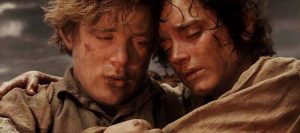
And, for what feels like the first time, I have to give praise to Sean Astin as well, who transforms into an absolute powerhouse in the film’s third act: throughout the first part of the film, he’s at an all-time low, and Samwise is an almost unbearably annoying character, but Astin lets himself go wild toward the end of the movie, as Sam’s heart hardens against the obstacles that Mordor throws at them, as he survives through the sheer power of his love for Frodo and his desperate hope to see the Shire again. His speech to Frodo on the slopes of the Mountain, as they climb, exhausted, toward the fiery chasm, is inspirational and heart-warming: I can even excuse Astin’s line delivery on “Let us be rid of it!”, just barely, because of how passionate he is in that scene. But I do still have to disagree with those who claimed that Astin deserved to be nominated for the Academy Award for Best Supporting Actor: you simply can’t nominate him, and not Elijah Wood, who gives a consistently excellent performance.
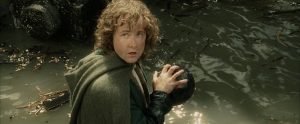
If anybody from King deserved a Supporting Actor nomination, it really should have been Billy Boyd. His performance as Pippin Took is one of the most exciting revelations in the entire film: in Fellowship, he was comic relief; in Two Towers, he was barely passable as a character with actual agency; but here, separated at last from his better half, Merry, Boyd proves definitively that he is the better half. While Merry Brandybuck (Dominic Monaghan) sinks into obscurity for much of the movie’s run-time, Boyd’s Pippin vociferously devours every scene he’s in, even stealing the spotlight from Ian McKellen on numerous occasions (no easy feat). Frightened and alone in the city of Minas Tirith, Pippin acts out at first, rebelling against Gandalf’s orders by swearing fealty to Gondor: but he soon learns that his position is not merely ceremonial, as he is expected to aid in the last, hopeless defense of the kingdom’s supposedly unbreachable walls. Faced with the overwhelming prospect of certain death, and the agony that grief and depression can cause, Pippin refuses to be bowed down, even as circumstances grow more and more evil: when he sees the Steward of the City about to burn his son alive (long story), he moves on instinct, racing to save his friend, screaming and struggling as he is dragged away from the pyre. “He’s not dead! He’s not dead!” His screams reverberate in your ears, and you can’t help but feel his raw horror at what is unfolding before him, so alien to his hobbit eyes. His conversation with Gandalf (Ian McKellen) shortly afterwards, about death and what waits in the afterlife, is heartbreaking: Pippin, whom J.R.R. Tolkien himself called the most cowardly of the hobbits, is no longer afraid of death – instead, he welcomes the thought of leaving the world behind, of flying far away to that far green country under a swift sunrise.
Boyd also displays some incredible physical acting in a scene early in the film’s run-time, when he looks into the magical seeing orb, or palantír, of Isengard, and becomes enraptured by the fiery Eye of Sauron: Jackson makes a mistake filming portions of the scene in slow-motion, because Boyd’s frantic writhing and contortions are much more terrifying in real time. Never one to miss out on the fun, Viggo Mortensen’s Aragorn also grabs the crystal ball for a moment and gets to show off some of his own skill at falling and going limp, in an uncharacteristic moment for the composed son of kings.
Speaking of which, Viggo’s acting throughout the film is what saves Aragorn, whose character’s backstory becomes more convoluted by the minute, from becoming a total enigma to the audience. In the first two movies, his whole story seems pretty simple: he’s the heir to the throne of Gondor. But I can only imagine how confused general audiences must be when Return Of The King rolls around, and the movie throws in a whole bunch of new elements, without explaining any of them in adequate detail: the Stewards of Gondor, the mysterious White Tree, the idea that Aragorn actually doesn’t come from Gondor, but from a different lineage, one which Denethor (John Noble) scornfully calls “a house long bereft of lordship”, not to mention the whole story of Isildur and the Paths of the Dead – to add to the confusion, Isildur is mistakenly referred to as the last king of Gondor by Legolas (Orlando Bloom), everybody’s favorite master of misdirection. Nevertheless, Viggo is still a joy to watch, and his performance is captivating: he never quite surpasses his work on Fellowship, but some of his finest moments here come close – particularly his crowd-pleasing speech at the Black Gate, rallying the Men of the West to stand: “This day we fight!”
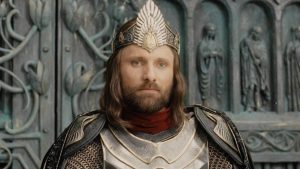
Not everyone has the privilege of being Viggo Mortensen though (imagine if we all could be: what a world that would be). The first act of the movie is rich in detail, extremely complex, and all very good: but it ultimately sets up more story threads than can logically be explored and tied together in the theatrical editions: the palantír is a good example of this – first introduced in Fellowship, the sphere has little purpose there except as a telecommunications device for Saruman (Christopher Lee) and Sauron. But in the first few scenes of Return Of The King it takes on much greater significance: it catches Pippin’s eye immediately amongst all the wreckage of Isengard, and Gandalf takes it and hoards it away, allowing the mystery even more time to simmer. When Pippin steals it from Gandalf in Edoras and looks into it, an entirely new subplot is set up that goes nowhere: Pippin and Sauron seem to develop some sort of connection, and Merry tells Pippin bluntly that Sauron now thinks he has the One Ring, and will come for him. And yet, by the time Gandalf and Pippin have reached Minas Tirith, everybody has forgotten this fact, and the palantír is never mentioned or seen again…unless you watch the Extended Editions, where Aragorn uses it to contact Sauron and draw his eye away from Mordor before the Battle of the Black Gate in a crucial scene that should never have been left on the cutting room floor. As another example, there’s the Corsairs of Umbar: they’re referenced by Gandalf in some sort of weird, offhand prophecy, and Elrond (Hugo Weaving) tells Aragorn to go to the River Anduin and stop them before they reach Gondor. To do that, Aragorn has to take the Paths of the Dead, which is a hugely important part of the movie and takes up a good deal of screentime: but then cuts away just before the Dead swear allegiance to Aragorn. And when we finally see Aragorn again, what feels like an eternity later, he’s already defeated the Corsairs, and the army of the Dead (or, the army of CGI green soap-bubbles, as I’ve heard them referred to) is fighting for him. Incidentally, this is almost exactly how Tolkien himself handled the storyline in his novel (minus the soap-bubble ghosts), but even he knew that it wasn’t the best option at his disposal, and contemplated rewriting it many times. And again, this is something Jackson did better in the Extended Editions.
So why aren’t I reviewing those, you ask? Well, several reasons: firstly, because they’re intended specifically for hardcore Tolkien fans, and aren’t as accessible to general audiences who don’t know anything about Beren and Lúthien, or the huorns of Fangorn, or what the evening-star signifies in Tolkien’s mythos, etc, as the theatrical editions are; secondly, they have multiple pacing issues of their own, with King‘s Extended Edition alone adding a whopping 51 minutes to the film’s three-hour runtime, most of which is additional backstory, exposition, and scenes from the novel that wouldn’t have fit in the movie; thirdly, they aren’t the original movies that opened in theaters, won over critics and fans alike, and swept through the Oscars like a hot knife through butter – they’re cool add-ons to satisfy a few more purists; and finally, they are, as already noted, much longer, and a much bigger commitment for both me and you. Maybe next year.
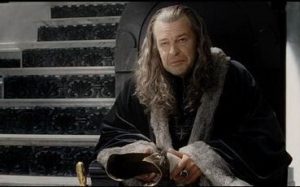
One area in which the Extended Editions are a great help, however, is with Denethor and Faramir (David Wenham), who are weak links in this great story: viewers who have only seen The Two Towers and not the subsequently added footage will still find it hard to relate to Faramir, whom they last saw as a villain, trying to waylay Frodo’s quest. At least until they finally get to see his father, Denethor, the Steward of Gondor; a delusional, despotic sociopath, hanging onto his rule by a thread, barely concealing his disgust at the thought of a King ever returning to Gondor – though, as I said, it’s never actually explained why Aragorn was in exile to begin with, and how this sad excuse for a man ever got in power. Denethor is utterly dehumanized, feasting on meats and blood-red fruit while his men perish in a massacre he staged to prove a point, and is seen trying to prevent Rohan from helping Gondor and then blaming them for not coming anyway (at which point Gandalf goes behind his back and lights the beacons calling for aid), trying to inspire cowardice and panic in his loyal soldiers (at which point Gandalf knocks him out), and trying to burn his own son alive (at which point Gandalf pushes him into the flames). Denethor dies as pathetically as he lived, a screaming fireball leaping from the parapets of Minas Tirith while Gandalf watches passively. And yes, every book fan knows that Gandalf and Denethor despised each other, but it’s a bad look for the White Wizard to have him basically murder the Steward of Gondor (though, in his defense, it was to save Pippin). John Noble’s portrayal of the Steward is, however, so slimy and distasteful that it’s hard not to applaud Gandalf’s choice: at least until you remember that Denethor in the books is a well fleshed-out character with deep psychological motivations and a cool, calculating mind.
This leads perfectly into a thorny subject: Jackson’s occasional decisions made in poor taste. The death of Denethor, robbed of its power, changed to be more “cool” onscreen, is only one example of this: another would be Jackson’s affinity for momentarily dramatic scenarios in which we find heroes doubting whether they should help their friends out of an incredibly dangerous situation for literally no reason – usually, only for about 0.1 seconds, which makes the “drama” even more grating and unnecessary. For instance, Théoden (Bernard Hill) claiming that Rohan shouldn’t ride to the aid of Gondor because Gondor didn’t send reinforcements to Helm’s Deep: I’d like to point out again that it would have been impossible for Gondor’s armies to get there in time, even if they had wanted to, but either way, it’s no excuse not to save the world. Or how about the King of the Dead laughing at Aragorn’s claim that he is the true heir to the throne of Gondor? The King of the Dead is eternally bound to Isildur and his bloodline: he would know better than anyone if Aragorn is telling the truth. Or, most insignificant of all, Gimli (John Rhys-Davies) having the audacity to claim, after the Battle of the Pelennor Fields, that they should end the war, and leave Sauron to rot in Mordor, despite all the evidence that this is a phenomenally bad idea (a claim made somehow worse by Gimli being seated disrespectfully in the Steward’s seat while saying these words).
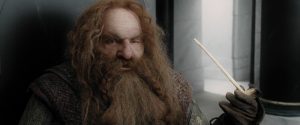
Any or all of these would be tolerable – if the same didn’t also happen to Frodo and Sam, in the most worthless, idiotic scene in the trilogy. Apparently convinced by Gollum (Gollum, of all people!) that Sam is stealing food (food that Frodo wasn’t eating anyway), Frodo freaks out at his best friend: and Sam makes the situation infinitely worse by telling Frodo that he’d be happy to carry the Ring for Frodo, if it would help. No, you ninnyhammer, it would not help! And just to make the scene worse, Jackson employs an extreme close-up shot of Sam’s lips saying “I can share the load” in slow-motion – and echoing! The whole effect is bizarre and almost unintentionally hilarious, as Frodo promptly screams at Sam to go away and return to the Shire. “Go home!” Seriously, does he actually think that’s possible at this point? And after breaking down in tears, Sam gets up – and starts going home. Even though he knows that his best friend is caught in Gollum’s grip, and is now entirely alone and helpless, the loyal Samwise turns tail and starts heading back down the stairs of Cirith Ungol, only to make up his mind at the last moment that, you know, maybe this isn’t such a great idea after all.
This scene is the lowest low in the trilogy, and it’s mercifully brief, but the damage is done. Perhaps worst of all, it renders Gollum weak: in Two Towers, he is cunning, crafty, and the war between his split personalities makes it impossible to figure out what he’s doing – but here, his plan to separate trusting Frodo from suspicious Samwise is laid bare to the audience in real-time, losing the element of suspense and surprise. And his plan is clumsy, anyway: instead of trying to frame Sam for eating too much lembas, Gollum could at least have staged some sort of scenario where Sam actually tried to take the Ring. As it is, his plan relies mostly on chance and incredibly good timing. And having Frodo abandon Sam halfway up the Stairs of Cirith Ungol also makes it unclear why Gollum even needs to bring Frodo into Shelob’s Lair – with Sam gone, why not just kill Frodo right then and there and be done with it? It’s one of Jackson’s worst offenses, and certainly his most unforgivable.
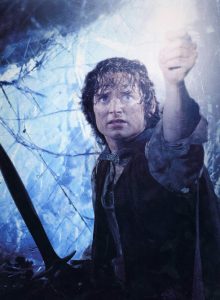
But enough of the bad! Let’s run over a few of Jackson’s most brilliant choices real quick: the battle sequences being the most obvious. I know that I, at least, have a hard time restraining myself from yelling the war-cry of the Rohirrim when the first light of dawn breaks over the Pelennor Fields, slowly illuminating rank upon rank of the Riders of Rohan (in a scene lifted almost verbatim from the book, minus the rooster). And I still feel a chill when Grond, the war-hammer of Mordor, comes rolling across the plain, accompanied by chanting orcs, while Gandalf’s eyes widen in horror (another nod to the book, as Gandalf recognizes the name of Grond as that of the weapon of Morgoth, the first Dark Lord of Middle-earth). The incredible height of Minas Tirith, and the camera-angles which Jackson uses to emphasize that height, and the height of the siege-towers and hulking Mûmakil are awe-inspiring – everything is big on the battlefield: the trebuchets tumbling from towers and ruined walls, the flying rocks and missiles in the air, the fell beasts sweeping low over the city’s streets and battlements like vast black fighter planes. And, of course, the small, intimate moments: the death of Théoden in the arms of his niece, Éowyn (Miranda Otto), herself fresh from a miraculous triumph against the Witch-King of Angmar – or the reunion of Merry and Pippin in the cold evening, while the “Shire Theme” whispers in the air, reminding us of what’s at stake.
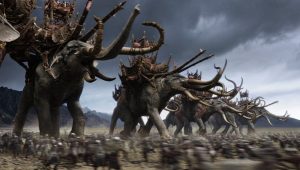
Howard Shore’s score, as always, is one of the main reasons to watch the films in the first place: his stand-out compositions for King include “Gondor In Ascension”, which ripples majestically down the sun-washed walls of Minas Tirith as Gandalf and Pippin first look upon the city; “Shelob’s Theme”, terrifying and psychedelic, reflecting Frodo’s panic as he stumbles through web-choked tunnels and pits filled with corpses; “The Rohan Fanfare”, employing Shore’s beloved Hardanger fiddle; and, of course, “Into The West”, the emotional lament which accompanies Gandalf’s speech about death, and also plays over the film’s closing credits, beautifully performed by Annie Lennox: the song’s lyrics, written presumably from Sam’s point of view, speak of meeting Frodo again in a far away place beyond the sea, where all pain and grief are healed.
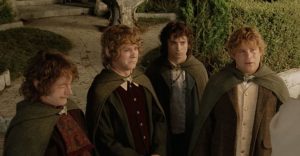
The Return Of The King is a story of that pain, which cannot be eased in this mortal life: it is about losing something, making the ultimate sacrifice, so that others may prosper; it is about the valiance and bravery of men and women who risk their lives to keep others safe, to protect something, something worth fighting for. It is about the choices we make in this life, to make sure that those who come after won’t have to make those same choices. It is about Théoden, an old man on the edge of death, dying to save a world he will never know. It is about Aragorn, entering the abode of the dead and righting the wrongs of his ancestors, for his love, and about Arwen giving up the gift of her immortality in exchange for a single life with hers. Éowyn’s sacrifice is for her uncle, and Merry’s for Éowyn; Faramir for his father, and Pippin for Faramir, as payment of a debt owed to Boromir, who lost his life defending Pippin and Merry; Sam for Frodo, and Frodo, ultimately, for the world.

Detractors talk about how not enough characters die in Middle-earth, and thus the stakes are too low. These people have (a) not read The Silmarillion, in which everybody dies, and (b) are also unable to understand that, in Tolkien’s world, death is not an evil. It is a gift to the human race – it is even envied by some of the immortal Elven-folk, who must waste away in a lonely earth for all eternity. Death is something we all need to embrace and accept (unless you want to go all Númenórean, in which case: good luck). It is, in fact, only a challenge to those who are alive: we have a short span of time in which to change the world, to begin something that can outlast and outlive us, to save the proverbial Shire – but not for ourselves. Tolkien and Jackson both say the same thing, and their message is clear: don’t waste what you have been given. Cherish your life, your earth, and your time, and use well the days, my friend.
And don’t worry – someday we’ll all be able to board the grey ships of the Elves, ride the singing waves out into the sunset, and take our own paths into the West.

Movie Rating: 10/10
Elijah has the most book accurate performance, Viggo did beautifully for what his character was supposed to show, but Elijah…Elijah was able to capture the essence of Frodo, a pure soul being tossed into a game of war and greed and destruction, and in the end not being tainted by it, merely changed , and above everything else, always having hope, maybe not for himself, but for a better world.
“How do you pick up the threads of an old life…when in your heart, you begin to understand, there is no going back…”
I agree! Elijah’s portrayal of Frodo is very touching, and heart-breaking. He’s consistently my favorite part of the trilogy.
Gollum is the best character … hands down
He is, without a doubt, one of the best characters in cinematic history: and Andy Serkis does a fabulous job portraying him.